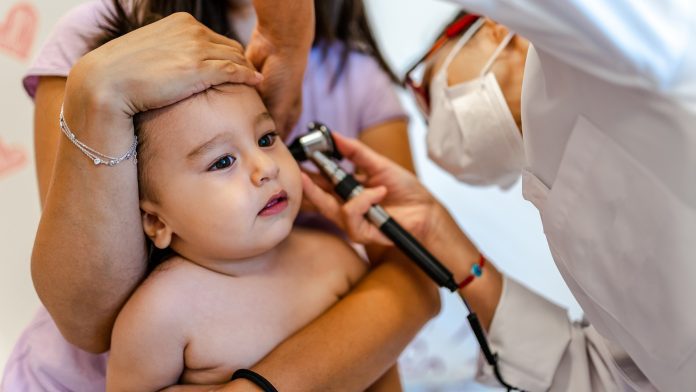
A new thesis from Karolinska Institutet reports that screening programmes for childhood hearing loss need urgent improvement.
According to the World Health Organization, around 34 million children are facing hearing loss. It is believed that 25-50% of childhood hearing loss occurs after infancy, and in almost 50% of affected children, hearing deteriorates throughout childhood.
Hearing loss in children has a detrimental effect on their spoken language, consequently affecting reading, social communication and education. This highlights the need to improve screening programmes to ensure early diagnosis.
“A delay in language development can have lifetime consequences, and it is therefore vital that infants and children with hearing loss receive intervention as early as possible,” said Allison Mackey, who recently completed her doctoral thesis under the supervision of Inger Uhlén at the Department of Clinical Science, Intervention and Technology, Karolinska Institutet.
Lack of data available for hearing loss screening tests
The thesis evaluated how well the childhood hearing screening programmes were performed and strategies to improve their outcome.
“For example, we carried out an international survey about the status of screening programmes in both high- and middle-income countries in Europe as part of a large multicenter project,” Allison Mackey said. “It showed that most high-income countries perform newborn hearing screening on all infants, however, only a few middle-income countries had similar programmes. We also found that in most countries, data were not available regarding the outcomes of the screening programme.”
Routine hearing tests are currently offered to newborn babies and children to identify problems early in their development. In the UK, the NHS offer hearing loss checks within a few weeks of birth, from nine months to 2.5 years of age and again at around four or five years old. Hearing problems occur for various reasons, including, glue ear, infections that develop in the womb or being starved of oxygen at birth.
Improve follow-ups with children
The thesis also highlights that follow-up appointments are limited, which is an area of concern.
“In many programmes around the world, a high percentage of infants, who do not pass screening, are not returning for a follow-up assessment,” Allison Mackey added. “This could be due to several factors, but we could see, for example that the experience and knowledge of personnel involved in the screening programme has an impact on the statistics.”
The passing criteria used for screening are important determinants of programme sensitivity. Introducing stricter criteria will lead to more babies with hearing loss being detected in the screening programme.
“Though, unfortunately, the lack of data across many programmes makes it difficult to evaluate the quality of screening programmes,” Allison Mackey concluded. “If decision-makers want to address issues such as loss to follow-up, they first need to know the status quo. Therefore, the very first step toward improving a screening programme is to set up processes for collecting data and regularly monitoring and evaluating outcomes.”










